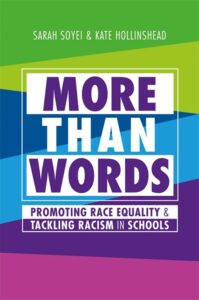More than Words: Promoting Race Equality and Tackling Racism in Schools

- Published
- EqualiTeach
By Kate Hollinshead
Promoting race equality and tackling racism in schools is about much more than words. However, knowing where to start on this journey towards equal, diverse and inclusive schools and what actions to take to create meaningful change can be difficult to decipher. This blog aims to provide a brief overview of just a few of the ways in which good race equality practice can be implemented within education settings, taking excerpts and quotes from More Than Words; a comprehensive guide to best practice in this field.
Starting the Journey
“Society provides some people with accommodations that are seen as normal, natural and traditional, but actually accord them privilege over other groups.”
Reflection is an important part of starting the journey. Understanding our position within society; the privileges parts of our identity may or may not afford us; and overcoming attitudinal barriers which may prevent full engagement with this work all ensure that our starting point is one of clarity and understanding of the real issues that need to be tackled. Time and again we hear barriers such as ‘But I don’t see colour, I treat everyone the same…’, ‘But we don’t have many Black or Asian children in school…’, ‘But I’m not sure if it’s my space…’, and ‘But what if I say the wrong thing?’
Without addressing these common barriers and misconceptions, race equality work can faulter before it’s even truly begun.
Embedding Race Equality in Teaching Practice
“Myths and misconceptions about groups of people [can be described] as an ‘archive of knowledge’; ‘a store of myths and prejudices that people possess about ethnic groups other than their own.’ (Young in Pearce, 2005)”
This is an archive from which false and damaging expectations can arise, causing harm to the young people at which they are so often unconsciously aimed. Inclusive teaching practice is about overcoming these myths and prejudices; understanding cultural differences; developing unbiased and equitable relationships with all pupils; developing knowledge about our pupils’ ethnicities and backgrounds; and learning from parents and carers.
Educating Young People about Race and Racism
“’I was once doing some advisory work for a school and a child happened to say… ‘Is it okay to say the n-word when you’re talking about a rap song?’ And the teacher just went, ‘Oh, we don’t use that word in our school, that’s a behaviour point!’…I thought, ‘That’s closed down that opportunity.’”
Conducting effective conversations with young people about race and racism is about allowing them a safe space to ask questions and have these answered accurately with space for reflection and further questioning. Work on race should start from when children first join the school and continue throughout their schooling journey, using age-appropriate resources and discussion techniques. Preconceptions should be addressed, and the correct terminology taught, so that pupils are equipped for life in modern Britain and are able to express pride in and understanding of their own identities and those of others.
Diversifying the Curriculum
“’I have been in other schools where I’ve thought, ‘That hasn’t quite been thought through, in order to be meaningful.’ ‘Oh, it’s Black History Month, right? We better have a Black scientist’ and they haven’t really thought, ‘Why are we teaching about that particular person? What do we want to draw out of this?’”
Diversifying the curriculum is about reflecting on resources and reference points; thinking about why certain examples are or are not used; and what can be done to ensure that all young people see themselves represented in the curriculum. Are there diverse cultures and people represented? Do resources counter or reinforce stereotypes? What messages are being sent out to the young people by which resources are used and when? This doesn’t mean that all existing content needs to be thrown away; but instead, opportunities to rebalance and diversify the content should be seized.
Effectively Challenging Racist Incidents
“We find the school that says, ‘Oh, we’ve never had a racist incident this year.’ And then we ask the students, and they say, ‘There was one last week, so and so called so and so this…”
Effectively challenging racist incidents is multi-faceted. Not only is it about challenging every incident and responding appropriately immediately after an incident has happened, but it is also about accurately recording the incident, carrying out a robust investigation, communicating outcomes to all parties and providing opportunities for restorative justice where necessary. There should be a collective, whole-school approach to challenging racism, where the burden of dealing with racism doesn’t just all to the target of an incident but where everyone feels empowered to call out inappropriate behaviour, that racism is unacceptable to everyone in that environment.
Creating Whole-School Change
“In a school which is successfully promoting race equality, school leaders are avoiding tokenistic approaches and instead working with a set of clear, inclusive values that drive everything they do and that are understood and lived by all member of the school community.”
Race equality best practice must permeate all areas of the school life. Thriving anti-racist schools are those that also set SMART equality objectives with action plans, have robust policies and procedures in place, conduct equality impact assessments, collect and analyse monitoring data, consult with the wider school community, and ensure staff teams and governing bodies represent the communities they serve.
Promoting race equality is an ongoing and active process; there is no overnight fix. However, by taking action and creating meaningful change, schools will be demonstrating that their commitment to race equality is more than just words; taking steps to ensure that the environment is one where every member of the school community feels safe, celebrated and able to achieve.
For more insight and guidance into promoting race equality and tackling racism in schools, purchase our co-directors book ‘More Than Words’.
Profits received will go towards EqualiTeach’s Investing in the Future programme to help fund our work with schools and young people.

All copy holders will receive a 14 day free trial to EqualiTeach Empowered, our new subscription service for schools. This will be available after the launch in 2023 so watch this space!
- Categories: Equality, Race & Ethnicity, Uncategorised



